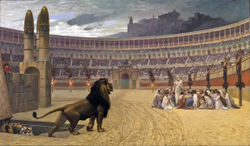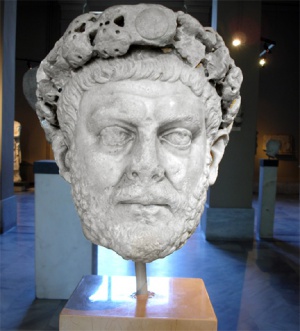Diocletianic Persecution
Diocletianic Persecution

The Diocletianic Persecution was some times called the Great Persecution in the Roman empire. In 303, The Emperors including Diocletian at the beginning of the 4th century issued a series of edicts rescinding the legal rights of Christians. This tells us that Christians had rights at that point. Freedom of religion had existed but there had been changes concerning the Christian conflict.
They had outlawed foreign religions through the edicts of Emperor Septimius Severus but now they demanded that everyone comply with traditional Roman religious practices.
What were those practices?
They demanded all inhabitants to sacrifice to the gods.
What did that mean?
The Latin word salus means "safety", "salvation", "welfare". Salus was the goddess of security and well-being this would include individual welfare, health and prosperity. This prosperity was perceived as important to the peace of the state.
Pax deorum (“peace of the gods”) was the goal of Roman state religion.
Being at peace with the gods was mutually beneficial to the state and the Roman public welfare (salus publica; cf. Cic. Rab. perd. 5). If the Romans were not providing to the gods their desired worship there would be shortages in the salus or welfare and riots would ensue.
The Christian community grew from 250 to 300 A.D. The estimated population of 1.1 million may have grown to as many as 6 million which may have been about 10% of the empire's total population.
With the rise of its popularity with successful Romans who paid into the Church rather than the Pagan Temples of Rome came jealousy and envy. Christians got a lot of criticism but the real problem as always was the money.
The Christian apologist Arnobius of Sicca who wrote Adversus Nationes composed in response to Diocletian's persecution of Christians attributes the persecution to financial concerns to providers of welfare benefits through the pagan temples.
- "The augurs, the dream interpreters, the soothsayers, the prophets, and the priestlings, ever vain...fearing that their own arts be brought to nought, and that they may extort but scanty contributions from the devotees, now few and infrequent, cry aloud, 'The gods are neglected, and in the temples there is now a very thin attendance. Former ceremonies are exposed to derision, and the time-honoured rites of institutions once sacred have sunk before the superstitions of new religions.'"[1]
Religion was more than just superstitions and doctrines but was the performance of their duty to their fellowman by providing a Daily ministration for the needy of society. Fortūna, equivalent to the Greek goddess Tyche was the goddess of fortune while Spes was the goddess of hope. The Christians only practiced Pure Religion and did not depend on the the fortunes of the Fathers of Rome in hope of their benefits. Christians depended upon Charity and not the "extort(ed) but scanty contributions from the devotees" subject to the Genius of Rome.[2]
These were cults and the word cult was a noun from cultus originates from the past participle of the verb colo, colere, colui, cultus, which means "to tend, take care of, cultivate".
Cultus was an aspect of the contractual nature of Roman religion.
You could choose any cult but you had to contribute to one and would need the symbol of that temple displayed by you out side or in your house. You might carry a pendant.
Understanding things like the Imperial Cult of Rome and the two Welfare_types will give you a perspective on the Christian conflict and the difference between what Rome was doing and what we are doing today.

Roman government become despotic because the people wanted to force their neighbor to secure their welfare. The centralization of this power corrupted by focusing the greed and covetous of every man's soul, their "genius" into the office of the emperor. Diocletian was asked to come back from retirement and settle the grab for power replied, "If you could show the cabbage that I planted with my own hands to your emperor, he definitely wouldn't dare suggest that I replace the peace and happiness of this place with the storms of a never-satisfied greed." A votive deposit or votive offering is one or more objects displayed or deposited, without the intention of recovery or use by the giver, in a sacred place for broadly religious purposes. The Sacrifices upon the living Altars of the Kingdom of God were votive offerings and the compelled and even voluntary offerings given to the temple of Rome were also votive deposit. Things sacred were things given up or over to the priests of religious institutions. Religion was the fulfillment or performance of your duty to your fellow man. That duty included the care or welfare of other members of your society who fell into need.
Rome and Israel as Republics both cared for the need with freewill offerings through a system of ministers. These offerings (also called Corban, qorban, korban) or sacrifice were for religious purposes. Both nations began to force these offerings or contributions through government run social welfare schemes. This was contrary to the teachings of the Moses and the Torah, John the Baptist, Jesus and Paul the Apostle and therefore the early Christian Church. It was also against the principles of many Romans and Greeks like Polybius and Plutarch who warned the people of their Socialist tendencies.
In ancient Roman religion, Annona (Latin annōna “corn, grain; means of subsistence”, from annus "year") is the divine personification of the grain supply to the city of Rome. She is closely connected to the goddess Ceres, with whom she is often depicted in art.
Later edicts targeted the clergy and demanded universal sacrifice, ordering all inhabitants to sacrifice to the genius of the gods.
According to Diocletian second edict it targeted deacons, lectors, priests, and bishops. These people were essential to provide Church services to the needy of the Christian society. So many were arrested the prison system overflowed which caused ordinary criminals to be released.
The fourth edict at the beginning of 304 A.D. ordered all men, women, and children, to gather in a public space and offer a collective sacrifice. If they refused, they were to be executed.
The persecution varied in intensity across the empire—weakest in Gaul and Britain, where only the first edict was applied, and strongest in the Eastern provinces. Persecutory laws were nullified by different emperors at different times, but Constantine and Licinius's Edict of Milan (313) has traditionally marked the end of the persecution.
There is always an element of society that wants to force contributions of their neighbors because they are both covetous and slothful. Early Christians practiced Pure Religion and did not take benefits from men who called themselves Benefactors but exercised authority in the collection of these votive offerings.
A votive means something "Given or dedicated in fulfillment of a vow or pledge: a votive offering." The term votive comes from a Latin term which means a vow. When Jews signed up for Herod's public Corban they vowed to pledge regular contribution by statutory directives. The same was true for those who signed up with Augustus and his free Bread and circuses. Many people saw the error of this way and with the hearing of the Gospel they repented and became Christians.
These same systems have been set up in almost every country and government of the world today. Your national social security contribution is your votive offering given to take care of the needy of your society and the administers of those systems who enforce your pledges and vows according to statutory directives are your true religious ministers. Early Christians died rather than sign up for such Covetous Practices. Modern Christians have need of Repentance.
If you need help:
- Or want to help others:
Join The Living Network of The Companies of Ten
The Living Network |
Join Local group |
About |
Purpose |
Guidelines |
Network Removal
Contact Minister |
Fractal Network |
Audacity of Hope |
Network Links
Religion |
Pure Religion |
Private welfare |
Fleeing Religion |
False religion |
Public religion |
Our Religion |
Christian conflict |
Corban |
Baptism |
Benefactors |
That Word |
Daily ministration |
Modern Christians |
Diocletianic Persecution |
Christians check list |
gods |
Judge not |
Judge |
Fathers |
Deist |
Damnable heresies |
Factions at the altar |
Pharisees |
Sadducees |
Zealot |
Essenes |
Levites |
Messianic Judaism |
Menahem the Essene |
Sanhedrin |
Altars |
Clay and Stone |
Red Heifer |
Golden calf |
Freewill offerings |
Religion |
Pure Religion |
Public religion |
Christian conflict |
Paganism |
Denominations |
Dispensationalism |
Benefactors |
Corban |
Daily ministration |
Calendars |
Cult |
Imperial Cult of Rome |
Guru theories| |
Covet |
Merchandise |
Mark of God |
Mark of Cain |
Mark of the Beast |
Nature of the Beast
Section 666 |
Benefactors |
Biting one another |
Cry out |
Worship |
Church |
Temples |
Religious Orders |
Priests |
Kings and priests |
Hear |
Bible Index |
Network |
Ministers |
Why Minister |
Minister of the world |
Minister of the Church |
Elders |
Deacon |
Priests |
Levites |
Breeches |
Hierarchy |
Altars |
Stones |
Stoning
Daily ministration |
Corban |
Welfare |
Essenes |
Disciples |
Seven men |
Church |
Church legally defined |
Christian |
Churches |
Ministry Burnout |
Religion |
The Blessed Strategy |
Widow |
Tens |
Tithing |
CORE |
COM |
Minister of Record |
Benefactors |
Cain |
Nimrod |
Constantine |
Christian conflict |
Fathers |
Lady Godiva |
Isaac Backus |
Government and Liberty Described |
Monks |
Lost Monks |
Married Monks |
Monasticism |
Modern Monastic life |
Seek |
Votive |
Orders |
Religious Orders |
Rules of St Benedict |
Jesus |
Was Jesus rich |
Mendicant |
Vow of poverty |
Fervent Charity |
Denominations |
Guru theories |
Iconoclast |
Cult |
Bible Index |
First to do List |
Footnotes
- ↑ Arnobius, Adversus Nationes, 1.24, qtd. in Davies, 79–80, from a translation by Bryce and Campbell.
- ↑ In Roman religion, the genius (Latin: [ˈɡɛ.nɪ.ʊs]; plural geniī) is the individual instance of a divine nature which is present in every individual. Much like a guardian angel or the Holy Spirit, the genius would guide each individual from birth to death. The rational powers and abilities of every human being were attributed to their soul, which was a genius.